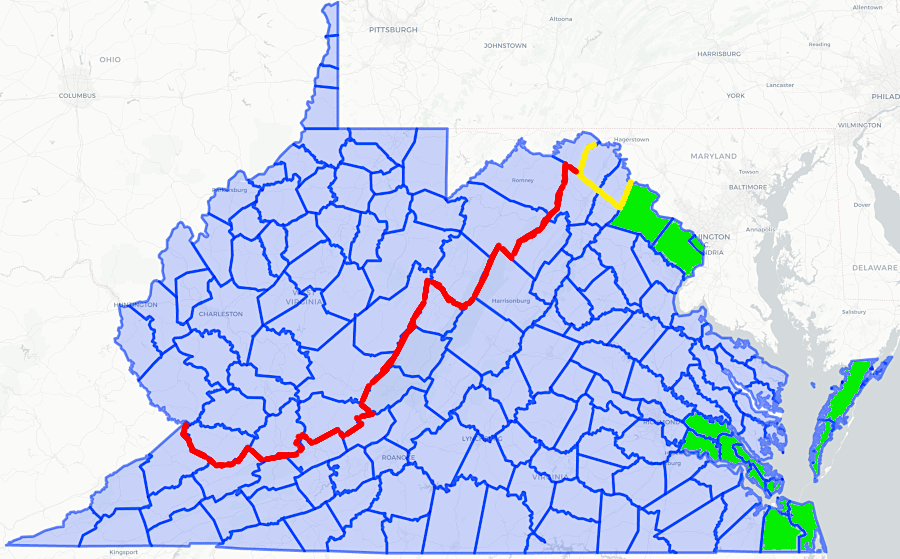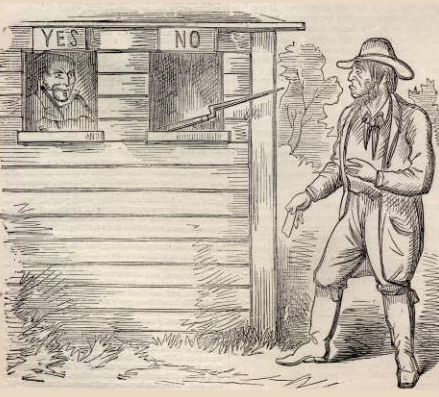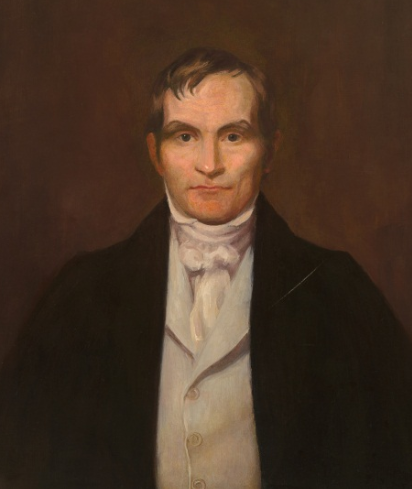1864 Constitution of Virginia

the 1864 constitution, prepared by the Restored Government of Virginia meeting in Alexandria, abolished slavery in Virginia
Source: Hathi Trust, Constitution of the State of Virginia, and the ordinances adopted by the Convention which assembled at Alexandria, on the 13th day of February, 1864
The Restored Government of Virginia, which stayed allied with the Union during the Civil War, revised the state constitution in 1864.
After West Virginia became a separate state in 1863, Governor Francis Harrison Pierpont moved the Restored Government of Virginia to Alexandria. The first meeting of the General Assembly there was in December, and Gov. Pierpont quickly requested that it authorize election of delegates to write a new constitution. With the creation of West Virginia, the Virginia Supreme Court of Appeals could not be organized. According to the 1851 constitution, some of the five judges were to be elected from districts that were no longer part of Virginia.
Dealing with slavery was a more critical concern in 1864. President Lincoln's Emancipation Proclamation went into effect on January 1, 1863, but it had not freed the enslaved peoples in the counties of Berkley, Accomack, Northampton, Elizabeth City, York, Princess Ann, and Norfolk, or the cities of Norfolk and Portsmouth.
Within those areas where the Restored Government of Virginia had civil authority, the governor theoretically was responsible for enforcing state laws that required returning runaways to their "owner." A constitutional convention organized in Alexandria was needed to rewrite the 1851 constitution and abolish slavery.
On January 21, 1864, voters elected 17 delegates to a constitutional convention. One delegate came from each of the counties of Accomack, Alexandria, Charles City, Elizabeth City, Fairfax, James City, Loudoun, New Kent, Norfolk, Northampton, Princess Anne, Warwick, and York, plus the cities of Alexandria, Norfolk, Portsmouth, and Williamsburg.

17 jurisdictions (including the cities of Alexandria, Norfolk, Portsmouth, and Williamsburg) sent delegates to the 1864 constitutional convention
Source: Newberry Library, Atlas of Historical County Boundaries
The delegates of the convention met at the Federal courthouse in Alexandria, which was under control of the Restored Government of Virginia, between February 13-April 11, 1864. The new constitution recognized the legitimacy of the creation of West Virginia by authorizing settlement of the percentage of "old" Virginia debts that West Virginia should pay. The 1861 meeting at Wheeling which led to the creation of the new state of West Virginia in 1863 declared:1
- The new State shall take upon itself a just proportion of the public debt of the Commonwealth of Virginia prior to the first day of January, 1861.
The Virginia legislators were clear that West Virginia's share would have to be negotiated. Those meeting in Alexandria in 1864 included in the new Virginia constitution:2
- ...no ordinance passed by the convention which assembled at Wheeling on the eleventh day of June, eighteen hundred and sixty.one, adjusting the public debt between Virginia and West Virginia, shall be binding upon this State.
The 1864 Virginia constitution required all white males who were at least 21 years old to pay a "capitation tax" equal to the property imposed on land assessed as worth $200 to support government operations, and then required an equal capitation tax to support free public schools. The delegates in the constitutional convention also gave the governor additional authority, allowing him to nominate judges for confirmation by the General Assembly.3

the 1864 constitution taxed all white males, 21 years and older, to fund public schools
Source: for Virginians: Government Matters, Virginia Constitution, 1864
The constitution written in Alexandria also replaced "viva voce" voting with the written ballot, and granted the right to vote to white men who had lived in Virginia for only one year. It also realigned the State Senate districts, assigning all the counties remaining in Virginia (including Berkeley and Jefferson) and the cities of Norfolk, Williamsburg and Richmond to one of 34 districts. The House of Delegates was authorized to have between 80-104 members, and voting districts were realigned to reflect the loss of counties to West Virginia.
Article III, Section 7 of the 1864 constitution still blocked ministers from being elected to the General Assembly.
The ability of the people to elect judges, created in the 1850 constitution, was eliminated. The 1864 constitution returned that power to the General Assembly. That shift may have reflected concerns regarding the difficulty of holding elections, but the members of the constitutional convention also would have feared that voters would not elect judges who supported the laws of the government based in Alexandria.
Most significantly, the 1864 constitution abolished slavery immediately within Virginia, and without compensation. The Emancipation Proclamation had not banned slavery in that portion of Virginia under Federal control, but the 1864 constitution applied (at least in theory) to the entire state. Article IV, Section 19 said:4
- Slavery and involuntary servitude (except for crime) is hereby abolished and prohibited in the state forever.
The convention did not submit the new constitution to a popular vote for ratification. That process would have been logistically challenging during the Civil War in the counties controlled by the Restored Government of Virginia, in which civil authority was limited by Union Army leaders focused on managing troops. The convention voted 13-4 to adopt the constitution, and the four opponents sought a ratification vote by the people.5
The 1864 constitution did not give black males the right to vote, but it did disfranchise many Confederates. It required each voter to take an "iron clad" oath saying that:6
- I have not, since the first day of January, eighteen hundred and sixty-four, voluntarily given aid or assistance, in any way to those in rebellion against the government of the United States
Passing a new state constitution in 1864 was relatively easy, compared to actually governing Virginia based upon it. That part of the state controlled by the Confederate government in Richmond did not accept the authority of the Restored Government of Virginia, which had migrated from Wheeling to Alexandria in 1863 when West Virginia became a separate state. That part of Virginia which was occupied by the Union military between 1864-65 was governed by officers, most of whom did not cooperate well with the civilian government under Gov. Francis Pierpont.

voters trying to elect representatives to conventions or ratify new Virginia constitutions during the Civil War faced unique challenges...
Source: Harper's Weekly, How Virginia Was Voted Out Of The Union
Union victory at the end of the Civil War meant that 1864 constitution applied to all of Virginia. It did not apply to Berkeley and Jefferson counties after the US Supreme Court determined in 1866 they were part of West Virginia. Governor Francis Harrison Pierpont moved from Alexandria to Richmond, and based his government on the new constitution.
Virginia abolished slavery statewide through the 1864 constitution, and abolition applied to local jurisdictions that had been exempted from the Emancipation Proclamation. The 13th Amendment to the US Constitution added a prohibition that was already within Virginia's state's constitution. As Union forces expanded their control across the state, abolition of slavery was implemented in practice as well as by law.7
In 1867, the US Congress declared Virginia was no longer a state but instead Military District Number One. Military officials governing Military District Number One were not constrained by the state's 1864 constitution In 1869, Major General John Schofield used his authority as the commanding general to appoint three new members of the Supreme Court of Appeals. The three incumbents, chosen by the General Assembly in 1866, were declared neligible because of previous service to the Confederacy.
Links
- Constitutions of Virginia
- Current Constitution
- Constitution Project
- The Federal and State Constitutions, Colonial Charters, and other Organic Laws of the States and Territories now or heretofore forming the United States of America (compiled and edited by Francis Newton Thorpe, 1909)
- Library of Virginia
- Virginia Law Review
- Virginia Memory (Library of Virginia)
- Yale Law School - Avalon Project

Philip Barbour chaired the 1830 convention that revised Virginia's constitution for the first time
Source: U.S. House of Representatives, Philip Pendleton Barbour
References
1. Sara B. Bearss, "Virginia Constitutional Convention (1864)," Encyclopedia Virginia, Virginia Foundation for the Humanities, September 8, 2016, https://www.encyclopediavirginia.org/Virginia_Convention_of_1864; "Transcript of the Proclamation," National Archives, https://www.archives.gov/exhibits/featured-documents/emancipation-proclamation/transcript.html; "Virginia Constitutional Convention Resolved to Abolish Slavery, March 10, 1864," Virginia Memory, Library of Virginia, http://edu.lva.virginia.gov/online_classroom/shaping_the_constitution/doc/convention; "Virginia-West Virginia Debt Agreement of 1861," Virginia Compacts, Virginia Legislative Inormation System, https://law.lis.virginia.gov/compacts/virginia-west-virginia-debt-agreement-of-1861/ (last checked July 18, 2021)
2. "1864 Constitution of Virginia," for Virginians: Government Matters, http://vagovernmentmatters.org/files/download/432/fullsize (last checked July 18, 2021)
3. "Virginia State Constitutions 1776-1971," Library of Virginia, 2021, p.4, https://www.lva.virginia.gov/71constitution/resources/Virginia-Constitutional-History.pdf (last checked July 18, 2021)
4. John J. Dinan, The Virginia State Constitution, Oxford University Press, 2011, p.12, https://books.google.com/books?id=fe9MAgAAQBAJ; Article IV, Section 19, "The Virginia Constitution: A Documentary Analysis," William and Mary Law Review, Volume 10, Number 2 (Winter 1968), p.514 (Table I), https://scholarship.law.wm.edu/wmlr/vol10/iss2/20/; Article IV, "Constitution of the State of Virginia, and the ordinances adopted by the Convention which assembled at Alexandria, on the 13th day of February, 1864," Hathi Trust, https://catalog.hathitrust.org/Record/010446671; "A Short History of the Supreme Court of Virginia," Supreme Cour of Virginia, https://scvahistory.org/scv/supreme-court-of-virginia/ (last checked July 21, 2021)
5. "The Virginia Constitution: A Documentary Analysis," William and Mary Law Review, Volume 10, Number 2 (Winter 1968), p.514 (Table I), https://scholarship.law.wm.edu/wmlr/vol10/iss2/20/; Sara Bearss, "Constitutional Convention, Virginia (1864)," Encyclopedia Virginia, December 7, 2020, https://encyclopediavirginia.org/entries/constitutional-convention-virginia-1864 (last checked July 18, 2021)
6. "Constitution of the State of Virginia, and the ordinances adopted by the Convention which assembled at Alexandria, on the 13th day of February, 1864," Hathi Trust, https://catalog.hathitrust.org/Record/010446671 (last checked June 21, 2019)
7. Sara B. Bearss, "Virginia Constitutional Convention (1864)," Encyclopedia Virginia, December 11, 2013, http://www.encyclopediavirginia.org/Virginia_Convention_of_1864 (last checked February 24, 2015)
Virginia Government and Politics
Virginia Places




